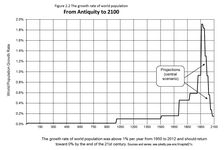DBT
Contributor
And how do you get from all that to "one billion represents long term carrying capacity for humans"??It's not a big if.
Basically;
Hunter gatherers are generally nomadic because they exhaust the resources of their territory, animals to hunt and plants to gather become harder to find, they move on and return when the area is replenished.
The land can only support so many hunter gatherers. There is a limit.
Farming secures the food supply, enables permanent settlements, towns and cities. Even that has its limits, which is why our population never exceeded one billion for our entire existence.
It was only the advent of the industrial revolution, large scale agriculture, machinery, medicine, etc, that enabled our spike in numbers and the related issues that we have experienced.
Under one billion was the reality, up until the industrial revolution. It wasn't for want of trying, the limit was imposed by our environment, climate, resources, disease, catastrophe, etc. For example, the population of Europe crashed in the 1500's due to climate conditions (mini ice age) series of plague, etc.
As for current times, given our technology, mechanization, medicine, etc, many the limitations of the past are not an issue, and we can manage a higher population, just not 8 billion or more in the long term.
The problem I have with your "if" is that it presumes a figure - one billion - that appears from nowhere. Why should the long term carrying capacity be a billion? Why not ten billion? or a hundred million?
I am seeing nothing at all that justifies your choice of a billion as the threshold. So why should we care about what happens if it is, given that it probably isn't?
One billion doesn't appear from nowhere. According to the research, our population never got to one billion until recent times. It was always under that figure for our entire existence up until industrial times.
That is the point. That our environment has set the limits to our grown for hundreds of thousands of years, first as hunter gatherers, then eight thousand years or so as farmers and citizens.
Our technology doesn't insulate us from our environment and its ecosystems. We still have environmental limits to growth and consumption, just that technology enables a higher population than at any time in the past.
Given that we are in overshoot now, what long term sustainability and population number may look like has yet to be determined. I guess we'll find out in the next few decades.




